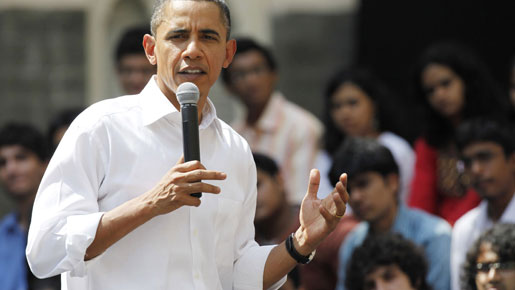
The spectacular crash of financial capitalism ought to signal springtime for the European left after two decades of the dominance of free-market ideology.
“If this is not the hour of social democracy, then when is?” asks Thomas Meyer, one of the German Social Democratic Party’s leading thinkers, in the latest edition of the policy journal Neue Gesellschaft/Frankfurter Hefte.
In just two months, the entire political spectrum in Europe and the US has shifted to the left. Conservative as well as centre-left governments have nationalised or bailed out banks, embraced tougher financial regulation and launched economic stimulus programmes.
Calls for state intervention to curb the excesses of capitalism and protect home owners and families from the credit crunch have replaced invocations of the magic of the market.
US voters have turned their backs on the conservative Republicans and elected a charismatic centre-left Democratic activist, Barack Obama, as president. And Karl Marx’s classic analysis of capitalism, ‘Das Kapital’, has been reprinted amid a surge of public interest. Yet far from boosting Europe’s mainstream left, the crisis has aggravated rifts between modernists and traditionalists in many countries and given new ammunition to anti-globalisation populists, notably in France and Germany.
Only in Britain and the Netherlands, where state rescues of collapsing banks have made Labour Prime Minister Gordon Brown and Dutch Labour Finance Minister Wouter Bos the heroes of the hour, have the centre-left’s poll ratings improved lately.
The mainstream left as a whole is at a low ebb. In 2000, socialists or social democrats headed 11 of the then 15 European Union governments. Now there are just four – Britain, Spain, Portugal and Austria. Bos’ Dutch Labour party and the German SPD are junior partners in governing coalitions.
Decline
There are many reasons for this decline: the shrinking of the unionised working class; the rise of rival far-left and green parties; the mainstream left’s difficulty in addressing sensitive issues such as immigration, multiculturalism and security; and chronic personal and factional feuding.
In the latter category, France’s opposition Socialist Party is tearing itself apart in a leadership battle between former presidential runner Segolene Royal and ex-labour minister Martine Aubry, who introduced the 35-hour work week.
Royal promises a change of generation and an alliance with the centre. Aubry is backed by an old guard of party barons. The fight is over personalities and power rather than policy.
One common denominator in many countries is a rift between educated, pro-European social democratic elites and traditional voter groups that feel they are the losers of globalisation. The left is out of power because it has got out of touch.
“There is a more conservative, nationalistic working class and lower middle class which is deeply hostile to European and global cosmopolitanism, and feels most acutely the impact of immigration,” said Ernst Hillebrand of Germany’s Friedrich Ebert Foundation, a think-tank close to the Social Democrats (SPD).
These disenchanted voters are fertile ground for far-right anti-immigration parties in Austria, Belgium and Italy, for Trotskyist Olivier Besancenot’s New Anti-Capitalist Party in France and for German populist Oskar Lafontaine’s Left party. They were the bedrock of the “No” vote that felled the draft EU constitution in France and the Netherlands, and its avatar, the EU reform treaty, in Ireland.
“We told you so”
As banks have crashed and shares plunged, a radical anti-globalisation left has been crowing “We told you so” and accusing centre-left politicians of having been accomplices to the free-for-all capitalism that created this mess.
“The big reason why the centre-left is not gaining from the meltdown is because they collaborated with neo-liberalism from the 1990s. The modernists are now depicted as collaborators by left-wing populists,” said Dutch Labour theorist Rene Cuperus.
“The situation is beneficial for the radical left in terms of their critique of capitalism,” he said. Centre-left parties have lost members in droves. Britain’s Labour has lost nearly half its membership since it won power in 1997 and has fallen below 250,000 members. Germany’s SPD has dwindled from some 750,000 in the 1990s to 480,000 now.
Part of that decline is due to the exhaustion of parties that have been in government for a decade. But some of it is because parties that embraced deregulation and modernised the welfare state to curb entitlement programmes have lost their mantle of social protection, Cuperus argues.
They now need a convincing narrative about reinventing the European social model to tame the free-market economy and provide more educational opportunity for the young and life-long learning and a safety net for the losers of globalisation. The Obama factor could help lead the way.
Too uncritical?
Conservative leaders such as Angela Merkel and Nicolas Sarkozy have reoccupied the Christian Democratic centre ground of the social market economy and the Gaullist tradition of a strong, interventionist state.
Roger Liddle, vice-chair of Policy Network, a transnational centre-left think-tank, acknowledges that Britain’s New Labour and some continental European social democratic parties became too business-friendly at the expense of their own electorate.
“At times, we have been too uncritical of business,” he said in an interview. “I don’t feel we need to apologise. The extent of the (financial) problems has taken everyone by surprise.” Liddle argues that the crisis could radically improve the prospects of European social democracy by resurrecting the case for an active state, provided the right lessons are drawn. “The task for modern social democracy is to design a new model of welfare capitalism for Europe,” he wrote in the Labour journal Progress.
“This is not the time to return to a protectionist, anti-European, anti-global, `socialism in one country’ model… We need a new paradigm that argues for a state with the necessary strategic capacity to act in order to shape the positive forces of globalisation at national, European and international level, not one that glorifies an all-powerful state and a return to old-fashioned interventionism.”

